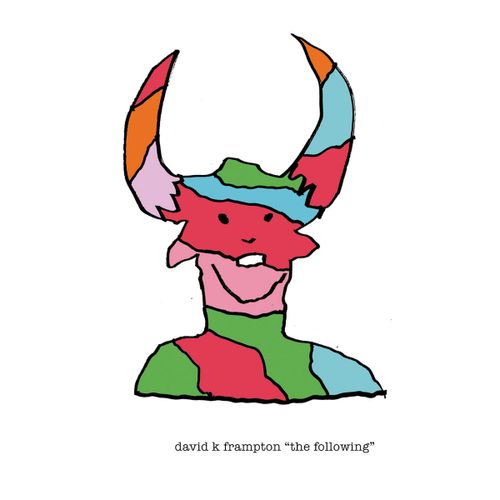DAVID K FRAMPTON - THE FOLLOWING
This work of outsider electronica is David K
Frampton’s first fully instrumental solo album release and one that harkens
back to his EDM origins with Truck Pitch and Process Records in the late 1990s.
The head honcho of Eyeless Records has often favoured a raw approach to
recording and mixing – wrong notes sometimes left in, adding oyster grit to
pristine melodies – that recalls the home studio origins of Ariel Pink or R. Stevie Moore. A
cultivated naivety has been a feature of his solo work since Love Songs and
Other Mysteries. Here we’re without the Brighton-based artist’s fragile high-pitched
vocal lead and harmonies that can sometimes recall the dream pop gauze of Sigur
Ros on releases like Tune Flower. He draws for this album upon the minimal techno and isolationist dub influences
of Robert Hood and Scorn circa Gyral to produce a set of
variations on simple rhythmic themes. Frampton manipulates drum beats and bass
lines live to produce six meditations, as he puts it, “on the darkness [and]
spinning infinities inside us all.”
Frampton explains The
Following is an “enquiry into cults, radicalisation and arcane beliefs and
how they effect and create meaning in the individual as we search for meaning
and validation ourselves.” If you want a good theoretical accompaniment and
guide for his musical imaginarium on this release, you could do worse than Erik
Davis’ media studies classic TechGnosis: Myth, Magic & Mysticism in the
Age of Information. An examination of the mystical compulsions underlying
the Western obsession with technologies of communication, Davis’ secret history
abounds with provocative concepts like ‘spiritual cyborgs’ and the
‘Datapocalypse’. The metaphysical impulses of Gnosticism have, Davis argues, implanted
themselves in our technologies rather than, as some historians have assumed,
being supplanted by them. UFO cults; the proselytizing of psychedelic gurus
like Timothy Leary; the attraction towards conspiracies, paranormal phenomena
and pop science fiction; the avatar existences of virtual reality and the
metaverse - all are manifestations of the “transcendent urge that animates
gnostic desire”.
The six lengthy tracks on The
Following could be describing “the tension between consciousness and the
machine” central to Davis’ notion of techgnosis. The austerity of Frampton’s palette
and a sometimes sedate pace (a kind of lopsided waltz-time on ‘Deep Woods’) acquires as a model the accumulation of affect and meaning through repetition that the critic
Philip Sherburne identifies as a central ingredient of minimal techno. Other
improvisational techno artists like Vladislav Delay and CoH produce music that
seems relatively texture rich in comparison. Frampton refers to John Carpenter
and Autechre as influences, but the shuddering dubscapes of Pole seem just as
relevant a reference point for the slower, sparser tempos of ‘Depth Flower’ and
‘Forbidden Electricity’. He uses filter and delay adjustments to open fresher
spaces that only serve to remind the listener of an overall single-mindedness of
pursuit matched with an obscurity of goal. Not that Frampton lacks a goal; more
that the collective trance state his music describes seems more impulsive than
teleological in orientation.
‘Real Meta’ is the standout track
here. Its motorik bounce recalls Kraftwerk’s Autobahn as other tracks
often suggest the real-time improvisation of 70s analog electronica exemplified
by Harmonia’s first album. It’s a reminder of electronic dance music’s utopian
origins, just as the blurred, distant beat of ‘Forbidden Electricity’ suggests some
steam-driven loom that subsumes liberation in discipline. A central theme of
Davis’ book, one that has only become more obvious since first publication in
the late 90s, is that our technologies of communication are both promising and
dangerous. Similarly, Frampton’s music draws inspiration from the notion of the
dancefloor as an anachronous space of candlelight and punishment. The wonky,
unquantized nature of his beats accentuates the notion of a kind of
medieval techno, one whose rhythmic patterns never quite cohere in a way that fulfils libidinal expectations.
‘Follow The Woods To Die’, the
album’s final track, could be describing the last days for members of a Heaven’s
Gate-style cult treading a path towards their final extra-terrestrial
rendezvous/place of collective suicide. The Book of Revelation is itself, for
Davis, a “kind of metavirus” or “a code to be cracked” that continues to colour
the apocalyptic fantasies of today. Frampton uses music, as Davis does words,
as a form of code to illuminate the way our technologies merge with our
subconscious desires to produce an imaginative space both seductive and
potentially destructive in its atemporality. The hermetic dancefloor Frampton
creates in The Following is a product of what Davis calls “reason and
its own hallucinatory excess”, shifting between fable and contemporaneity. It’s one
that casts hypnotic spells while its beats unfold, but also one you’re relieved to escape
from by its conclusion.
The Following is out now through Eyeless Records and available on Bandcamp:
https://davidkframpton.bandcamp.com/album/the-following
Text: (C) Copyright by Jon Kromka 2022




Comments
Post a Comment